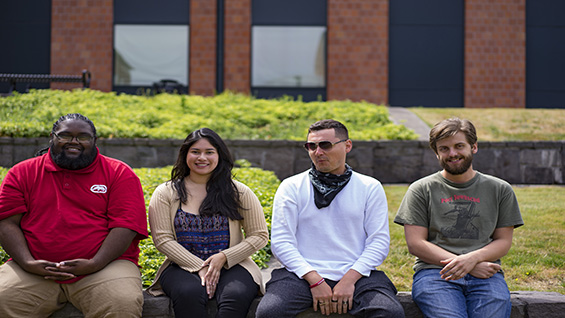Last May, Associated Students of Washington State University Vancouver President Jose Scott and Vice President Naomi Grande took office. Scott and Grande say that after spending the summer training and planning, they are ready to implement projects aimed at responding to student needs and encouraging student engagement.
One of the first projects involves the funds students can deposit on their Cougar Cards. “We’re implementing a Cougar Cash campaign to inform students of the funds they can deposit on their Cougar Card and use in the cafeteria or for printing,” Scott said.
Grande explained, “In the cafeteria, students using Cougar Cash save a lot of money on tax and go faster through the checkout process. It also works very well for printing.”
Scott and Grande also streamlined the use of Cougar Cash by creating a new link. Students can now go to vancouver.wsu.edu/cougarcash to view their balance and make deposits.
Scott and Grande also hope to increase student engagement in the political process by hosting town hall meetings on campus. They cautioned that it’s very early in the planning stages, but they hope to have one town hall meeting per semester.
The executive office is also developing new ways to collect student feedback. Grande reported, “We’re going to have an online place where [students] can anonymously leave comments, suggestions, compliments, and complaints.” Scott and Grande said it is too early to know whether the service will be offered through CougSync or another platform, but added that they will inform students through social media once it’s implemented.
The President and Vice President also reported that they worked through a body called Student Government Council to coordinate with the student governments on all WSU campuses. The discussions resulted in two collaborative projects. First, they are creating a resolution to bring Butch, the WSU mascot, back to the Vancouver campus. Current policy restricts the mascot’s appearance to only the Pullman campus. Second, all WSU campuses will coordinate to host a mental health day in October.
“We’re going to have a mental health day where all of the campuses are going to coordinate,” Grande said. “We can advocate for it on social media and inform students of the resources on campus.”
ASWSUV Senate is also involved. Michael DeManti, a Public Affairs major and Pro-Tempore of ASWSUV senate explained that the health day might also include a 5k fun run. The run would take place on the trails throughout campus.
Senate is also developing its own projects separate from the Executive Office. DeManti said another plan involves researching the feasibility of hosting a farmer’s market on campus. “We need to look over logistic issues and see if there are any obstacles involved before moving forward on that proposal,” DeManti said. “There are other issues to consider like whether it could be held on the weekend to avoid parking fees.”
“There is a plan that is beginning to be put in place to explore possibly opening a coffee shop on campus,” DeManti said. They are discussing the possibility of having local businesses donate coffee, but it is too early to determine whether the project is practical.
Both projects require more research before Senate decides to pursue implementation. “We have to determine how realistic it’s going to be,” cautioned ASWSUV Chief of Staff Max Vasilyev. “Even if we like it and everyone is on board, it still has to be approved by the Chancellor.”
Another project high on the Senate’s priority involves the tech fee approved by last year’s Senate. “Last year the tech fee was passed by the Senate, but we still need to refine the plan,” DeManti said. The original bill was very broad and could include funds for improving cell service, cyber security, and free printing. Senate needs to decide exactly how to allocate the funds among those areas, according to DeManti.
From a broader perspective, DeManti said that Senate will likely devote more of an emphasis this year to the affordability of attendance. “Tuition did go up 2.2 percent or $110 per semester,” he said. “One thing I think the Senate is going to have to think about is how we can reduce the cost of attendance.”
Like the Executive Office, DeManti said Senate is going to devote significant effort to involving the student body as they plan projects. “One thing we want to make sure of is that we’re accurately representing students,” he said. “We’re going to be actively tabling and hosting forums where we can hear from students directly.”
DeManti said Senate will decide more specific plans for the coming year during the first weeks of Fall Semester.
